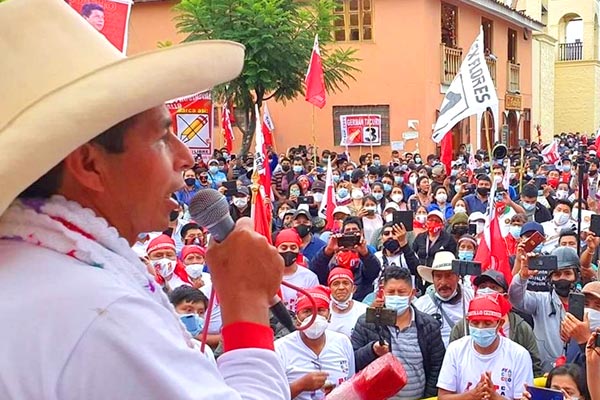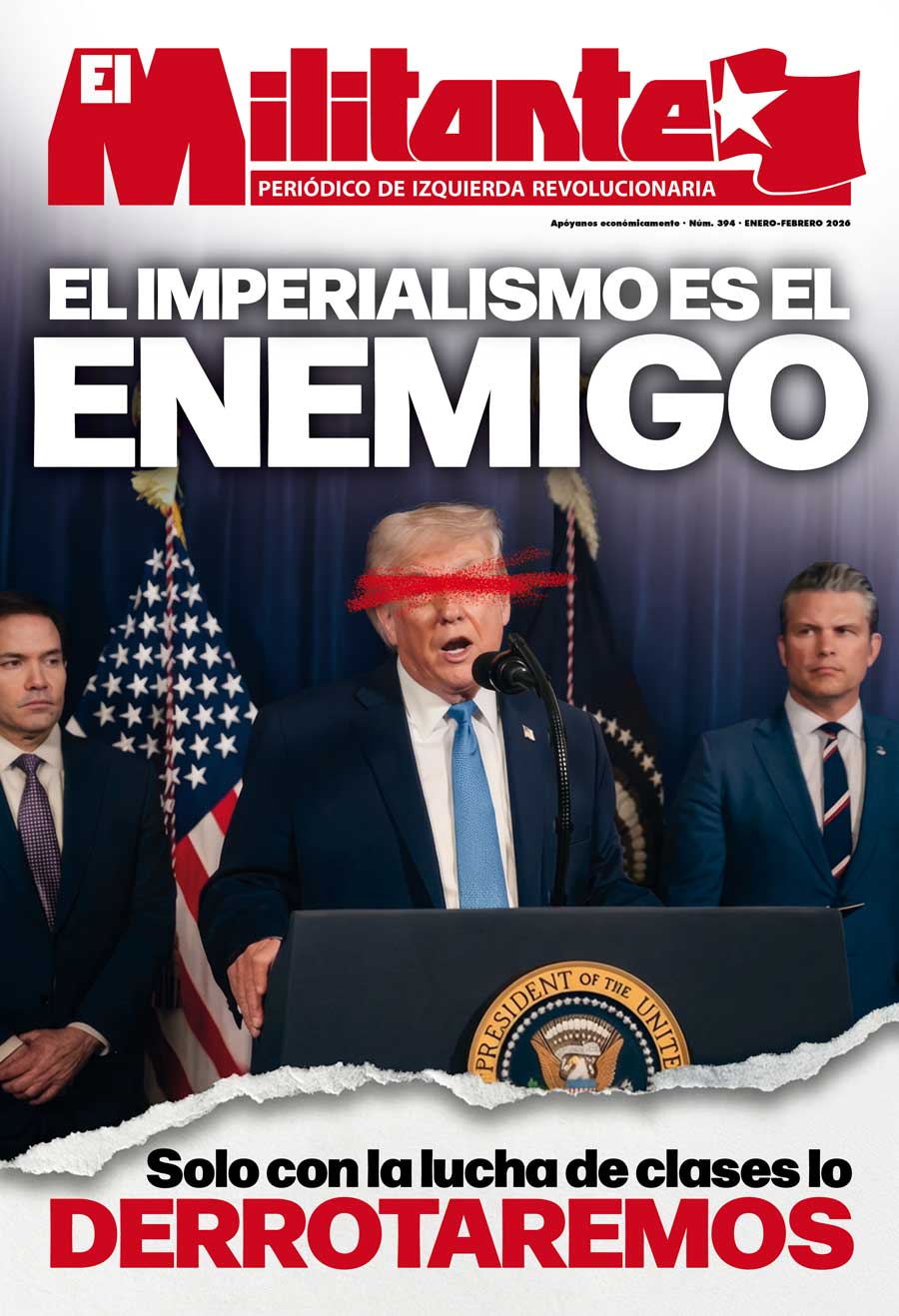¡Stop the fraudulent manoeuvres of the right. For a plan of action and a general strike!
Pedro Castillo, the left candidate, has won the Presidency in one of the most participated and tightly contested elections of Peru’s recent history. With 100% of the votes counted, Castillo has been given 8 835 653 votes, 50.125% of the total. His rival, the far-right leader Keiko Fujimori, got 8 791 656 (49.875%), 44.058 votes less.
.Although all votes have been counted, Fujimori and a section of the ruling class are still pushing for Castillo to not be declared the winner, and for the results of 808 poll stations (200 000 votes)to be annulled, all areas where Castillo got a clear win, in a shameless attempt to rob this victory from the people- the working-class and oppressed.
Castillo, a rural primary teacher who has come to the fore as the leader of the educatorś strike that shook the country in 2017, started the campaign for the first round with less than 2% of voting intentions. His support rose meteorically due to his speeches and campaigns based on denouncing the privileges and corruption of the ruling class, his proposal to end the 1993 constitution imposed by the fujimorist dictatorship, his demands to increased the healthcare and education budgets, push forward with the agrarian reform, increase state intervention in the economy and his talk of nationalising the gas, oil and mining industries.s.
The mass movement that supports Castillo is part of the left turn and revolutionary ascent happening in Latin America. Its victory is a big setback for the peruvian oligarchy and US imperialism, which have poured millions if not billions of dollars and sols( the peruvian coin) in supporting Fujimori and have unleashed the one of the biggest misinformation campaigns- a campaign of terror, a monopoly of the media as propaganda for its candidate, manoeuvres and attempts of fraud- one of the biggest campaigns that the Andean country has experienced in the last few decades, in order to stop a Left government to be formed.
Mass mobilisation defeats the bourgeoisie’s terror campaign
For the last two months, newspapers, radio stations and tv channels have devoted all their air time and platforms (political programmes, entertainment shows and even sports broadcasting) to hate sessions against Castillo.
The discredited parties of the regime, all the most reactionary bishops and evangelical preachers, assorted entrepreneurs, intellectuals, models, actors, sportspeople, have appeared in every nook and cranny calling and demanding on people to “vote well”, “stop communism” and for “Peru not to be another Cuba or Venezuela”.
The sinister hand of the secret services was also campaigning. Fifteen days before the election a mysterious terrorist attack murdered 16 people in the Vraem region, one of Castillo’s strongholds.
Attributed to the “Shining Path (Sendero Luminoso) SL”- a guerilla group whose sectarian methods have provoked massive backlash and were widely rejected by the peasants during the ‘80s and which even the peruvian state states it has been dissolved- the attack happened after months of baseless lies accusing Castillo of having ties to the “Shining Path”, accusations which have been repeatedly disproven,.
The tactic of identifying the left with the “Shining Path” has been used for decades by the ruling class, in an attempt to discredit and isolate any left alternative, especially amongst the peasant and mining communities. They have doubled their efforts this time, but with no success: Castillo has had a landslide amongst those regions and communities, with support and vote of 70 and even 80%.
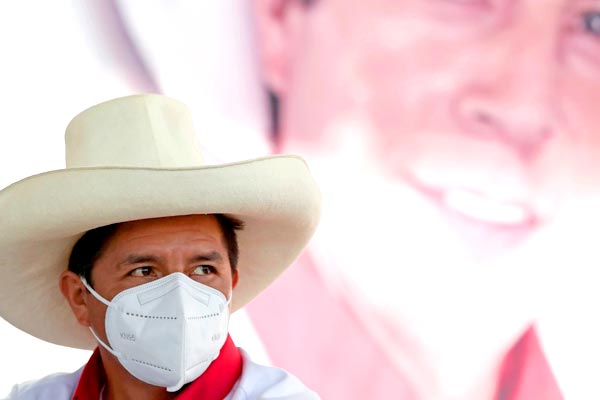
Once more, the massive and decisive mobilisation of the oppressed, on the ballot box and on the streets, has been the key factor to thwart the plans of the ruling class. The number of votes achieved by Castillo has been the biggest of any candidate in Peruvian history. As soon as the official count showed his overwhelming victory in the poorest regions in Peru’s interior, as well as the increase in support in the working-class neighbourhoods of Lima in relation to the first rou, the manoeuvres to try to steal the victory from the people started in earnest.
However hundreds of thousands of workers and peasants have immediately and forcefully answered these sabotage attempts, pouring into the polling stations to guarantee that their votes were counted and officialised, and marching from the periphery of Lima and the interior of the country into the centre of the capital, camping outside the Oficina Nacional de Procesos Electorales (ONPE)- the Electoral Commission- in defense of their results.
After delaying the result for days, hoping that the vote of the expats, favourable to Fujimori, would close enough of the gap in order to allow for fraudulent measures to be enacted, the Electoral Commission, as of 17th of June, is still refusing to officially declare Castillo the winter. Trying to impose from the newsrooms and the barracks what has not been achieved on the ballot boxes, Fujimori called for a demonstration in front of the ONPE and the Army headquarters on Wednesday the 9th of June.
Organise a general strike and develop action committees to defend the victory.
The polarisation on the streets is deepening the divisions at the heart of the ruling class. Afraid that Fujimoriś actions may backfire in an insurrection of the working-class and oppressed like the one that shook the country in November 2020, a section of the bourgeoisie has veered away from Fujimori and has even tried to neutralise her in order to avoid an uprising. On the 10th of June, the Fiscalía -the State Prosecution Service- issued a request for the preventive arrest of Keiko Fujimori due to various pending corruption accusations. Hours later, it was leaked that the interim president, Francisco Sagasti, had appealed to Mario Vargas Llosa ( the Peruvian Nobel Prize for Literature Winner) who supported Fujimori, to try to defuse the tension on the streets.
Nevertheless, other sections of the peruvian oligarchy and the latin american right wing have witnessed in panic the effects of an electoral victory that is the product of the direct action and rank-and-file mobilisation of the peruvian masses. They do not fear so much Castillo, but the mass movement that has hoisted him to the highest seat and that will now demand that he fulfills his promises and solves the urgent problems of the peruvian people. That is the reason why former presidents such as Uribe, Aznar and other representatives of the most reactionary layers of the ruling class have appealed for Castillo to not be officially proclaimed as President.
This division in the innermost echelons of the peruvian bourgeoisie extends a crisis that has been going for a long time and that has deepened after the November 2020 insurrection. That was when Merino’s government fell and the ruling class saw itself with no choice but to call for the recent presidential elections. Its objective was, in truth, to try to reshape itself and stabilise the situation. They have reaped a failure that reflects the weakness of capitalism and the andean ruling class.
The decision to delay the proclamation of Castillo as President, with the excuse that the Courts still have to decide about the annulments requested by Fujimori, means in practice to prevent the majority will of the people to happen, whilst different sectors of the ruling class precariously negotiate an exit strategy in the backrooms, which will work against the working-class and oppressed.
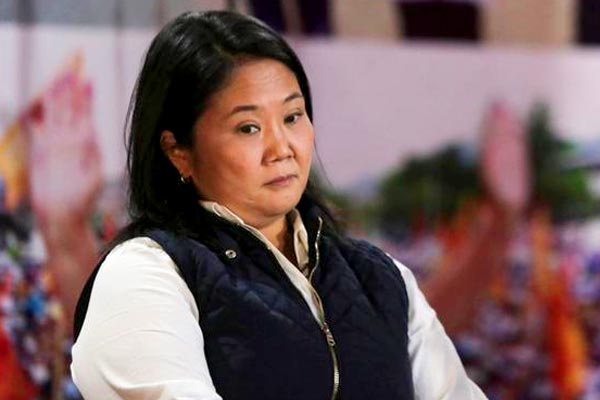
Castillo and the leaders of the unions and left organisations that support him need to forcefully reject this manoeuvres. They need to anchor and base themselves in the enormous strength and fighting spirit shown by the masses, and call a general strike and mass mobilisations across the country, demanding Castillo’s victory to be recognised and officialised. The promotion of the creation of committees and assemblies in defense of the electoral results is also needed, committees and assemblies that not only organise this struggle but link and unify all the popular and working-class demands to put them in practice by the Government.
With this actions, all the backlash from the fujimorist far right and layers of the state apparatus would be quickly defeated and overcomed, strengthening the confidence of the peruvian masses in their own strength.
Castillo will make a serious mistake if he takes the opposite road, accepting these manoeuvres and attempting to present himself to the financial markets as a guarantee of stability. He will never convince the oligarchs and imperialism of anything, but he might demobilise and confound the layers of the masses that support him today and that are willing to show it on the streets. Furthermore, that attitude will lead to renouncing sending a clear and decisive message to other layers which, although they have abstained, spoilt their ballot or even supported Fujimori, might be won with socialists measures, the only programme that can solve their problems.
There is no third way. Either yield to the capitalists or enact a socialist programme.
If the ruling class is finally forced to recognise Peru Libre’s victory, any negotiation in the backrooms, hidden from the masses, will be used by the bourgeoisie to force Peru Libre’s leaders to renounce any measure that threatens the privileges of the elite. The brutal campaign of terror, sabotage and fraud attempts that has been going on in the last few weeks will be nothing compared with the pressures unleashed on the government to betray the hopes of the masses.n.
The tightly contested result is already being used by a layer of the ruling class. They seem willing to recognise the victory of Castillo, and to use the slim majority to pose that with “a country divided in half”, the Peruvian teacher needs to renounce all proposals which do not have enough support from the Parliament, where although Peru Libre is the first political force, the parties of the establishment still wield the majority.
To yield to these pressures would be a path to disaster. The problems of the people are impossible to be solved within the framework of peruvian capitalism. Castillo, and the leaders of Peru Libre, are subjected to the pressure of antagonistic classes, and they will have to choose where they stand. Either with the millions of workers, youth and peasants that will support him in applying a socialist programme and ending the capitalist exploitation and misery; pr to concede to the pressures of the oligarchy, imperialism and the most reactionary sectors of society, who are already sharpening the knives and demanding that they conciliate.
To this peril we need to add the reactionary positions held by Peru Libre: opposing abortion rights, opposing same sex marriage, opposing the rights of the LGBTQ+ community and opposing the right to die… And their reactionary position of defending the death penalty for some crimes to fight against crime, their announcement that they are going to expel “all the foreigners that came here to steal” and “only to stay if you came here to work”. These sexist, homophobic and xenophobic positions open a wedge for the bourgeoisie and the right to divide and attack the oppressed and to find groupings of support amongst them for their counterrevolutionary plans.
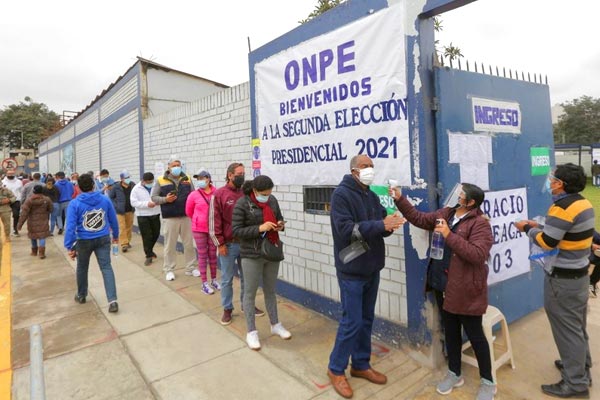
These reactionary positions have made it difficult for Castillo to mobilise even in a greater magnitude some layers that could have supported him in the second round, especially in big cities. Keiko Fujimori won in Lima, where she got 3.696.899 (65,70 %) of the votes, against Castillo’s 1.929.692 (34,29 %).
Fujimori’ s vote base are the layers that have lined their pockets with the neoliberal policies, as well as the most reactionary layers of society. However, many other of her voters come from layers of the middle class and even backward popular and working-class layers that, although suffering due to the policies of oligarchy, have been affected by the campaign of fear unleashed by the ruling class.
Although Castillo has increased his support in relation to the first round- especially in the poorest neighbourhoods of the main cities, where his support reaches 45%, compared to 20-25% in the middle class neighbourhoods- it could have been much higher if he had put a decisive socialist programme, stating that the resources currently on the hands of bankers, landowners, businesspeople and multinationals should be in the hands of the working-class people to democratically plan the economy: increasing the health and education budgets, offering vaccines and healthcare to all;dignified land, jobs, wages and housing...
All this would enthuse and carry through the mobilisation of the millions that already supported Castillo, and it would add to it many more young people, workers and peasants and even wide layers of the middle class that have abstained, voted blank or annulled their vote, or even voted for Fujimori.
For a United Left Front of the Left to struggle for the transformation of society.
The activists of the anticapitalist left, the feminist movement, the working-class and peasant trade unions, the student movement, need to drive a United Left Front to participate with a genuine socialist programme in the mass movement that supports Castillo and an action plan that is fit to fightback any attempt to derail the revolutionary mass movement.
The slogan of calling for a Free and Sovereign Constituent Assembly, a slogan defended by the majority of unions and left parties in Peru, hinders instead of helps the fightback against the attempt to derail the movement of mass struggle on the streets into the path of bourgeois parliamentarism.
The first task of the left is to keep up the mobilisation on the streets and to impel its organisation from the bottom up, from the rank and file, forming unified action committees with the immediate task- linked to the defense of the electoral result- to stop any coup or manoeuvre which tries to overturn the victory of the people.
Adding to it, we also need to demand from Castillo and the Peru Libre leadership to immediately put in place the more left-wing proposals of their programme without conceding to the blackmail of the capitalists- starting with the nationalisation of the big private monopolies, the banks and the sharing of the land to the peasants with the expropriation of the “latifundio” (the big private landowning estates).
Castillo, feeling the brutal pressures from the oligarchy, talks about a “popular economy with markets”. But soon real life will show that there is only one way to defend the people: to snap the wealth out of the hands of a parasitic minority and use it to face up to the urgent social needs.
Obviously, whilst we train our fire against the oligarchy, Fujimori and the right-wing, we cannot renounce the struggle to defend the rights of women and the LGBTQ+ community,we cannot renounce the fight against patriarchal justice, we cannot renounce the fight to defend the unconditional citizen rights of the workers born in Peru or abroad… Castillo needs to redress his backward positions and stop exploiting sexist, racist and reactionary prejudices that have no place on the left.
Armed with this action plan and a genuine socialist programme, the most combative workers, peasants and youth will get the support of the mass of the oppressed and open a way to the struggle for the socialist transformation of society both in Peru and on the whole of Latin America.






